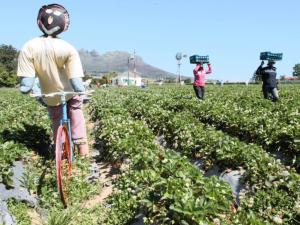(Press Release)- Smallholder farmers will soon be better able to weigh up the cost and benefits of adopting new practices that support some of the most overlooked contributors to global food security — the insects and other animals that pollinate their crops and boost yields.
“Three quarters of all food crops need insect pollinators such as bees to get good yields, and 35% of all food production globally comes from crops dependent on pollinators — but there are worrying reports of declines in pollinators from several regions of the world,” says Barbara Gemmill-Herren of the Food and Agriculture Organization of the United Nations (FAO).
Now, Maryanne Grieg-Gran of the International Institute for Environment and Development and Gemmill-Herren have co-authored a handbook that smallholder farmers and organizations that work with them can use to identify such pollinator-friendly practices and evaluate their impacts on livelihoods, incomes and health.
“Sharing information with farmers about pollinator-friendly practices is a good first step,” says Grieg-Gran. “But farmers will adopt pollinator-friendly practices only if they can see that these practices will bring benefits to them – and while cash always helps, other less tangible benefits may also be important.”
There are striking examples of farmers managing for pollination services – in Ghana, a mango farmer realized some of the common weeds growing under his trees attracted pollinators into the orchard. To conserve those pollinator species, the farmer chose to hand-weed rather than use herbicide even though weeding was four times more expensive. In Southern India, farmers who grow coffee and cardamom have chosen to plant selections of shade trees that flower at different times from the crops to ensure continuous forage for the pollinators. But farmers are often not aware of how best to manage their farms to make the most of this natural service.
The handbook, which will be published on 8 March by FAO, draws on work with farmers in Ghana, India, Kenya and Nepal.
To improve pollination of their horticulture crops, farmers in the Mankessim area of Ghana chose to try out reducing pesticide use, protect riverside vegetation and sacred groves that provide habitat for pollinators and allow flowering plants to grow along field borders.
In Uttarakhand State, in India, farmers who plant grasses to prevent soil erosion at the edges of their fields could instead use plants that also attract pollinators.
The handbook provides a five-step approach, centred in the farmer field school tradition, for smallholders to assess current production systems, identifying and testing new practices, and evaluating their impacts. It will enable farmers to weigh up the costs and benefits of adopting different approaches to farming.
“Wild pollinators are some of the most important contributors to global food security, but farmers often overlook them,” says Maryanne Grieg-Gran of IIED. “Farmers need to be directly involved in testing practices that encourage pollinators to visit their crops so that they can assess the benefits and costs for themselves.”
Barbara Gemmill-Herren of FAO adds: “As agriculture intensifies with large-scale monocultures and greater use of agricultural chemicals, pollinators are increasingly threatened. There is a critical need to develop agricultural practices that sustain and increase yields, based on the ecosystem services such as pollination provided by wild species.”
The publication has been produced under the Global Pollination Project, a Global Environment Facility-supported project, implemented by United Nations Environment Programme and executed by the Food and Agriculture Organization, with seven national partners. The production of the handbook was facilitated by funding from the International Fund for Agricultural Development.
To download the book as a PDF (from 8 March) visit http://www.internationalpollinatorsinitiative.org/documents.do
Contacts for interviews
Maryanne Grieg-Gran
Senior researcher
International Institute for Environment and Development
[email protected] / +44 (0)2034637399
Barbara Gemmill-Herren,
Focal Point, International Pollinator Initiative
Food and Agriculture Organization of the United Nations








